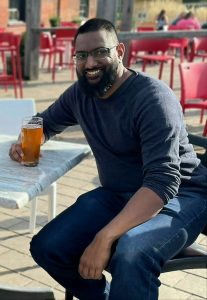 Name: Andrew Ramsook
Name: Andrew Ramsook
Program: Doctor of Philosophy in Rehabilitation Sciences (PhD)
Graduated: 2021
Dissertation: Sex differences in voluntary activation of the diaphragm
How would you describe your research project in the UBC Rehabilitation Sciences program?
I completed both my MSc and PhD in the Rehabilitation Sciences program at UBC. My overall research was based around respiratory physiology and the response to exercise. My Doctoral work focused on neuromuscular fatigue of the diaphragm, with a specific interest in evaluating sex differences in diaphragm fatigue. Females are, on average, more resistant to fatigue than males. With respect to respiratory muscles, this has been assessed through changes in transdiaphragmatic twitch pressure which measure the diaphragm’s ability to generate force. It is unknown whether the brain also contributes to diaphragm fatigue and whether females are more resistant to this ‘neural’ fatigue as well. I first determined that we can reliably measure voluntary activation of the diaphragm using cervical magnetic stimulation to assess neural components of fatigue. I then applied these voluntary activation methods to show that during whole-body exercise at similar relative intensities, males show a greater decline in voluntary activation of the diaphragm compared to females; however, when performing similar amounts of isolated inspiratory muscle work these sex differences are abolished despite a greater loss in contractile function in males compared to females. The results of my doctoral work suggest that aspects of neuromuscular fatigue of the diaphragm are task-specific and can vary between sexes. More work is needed to uncover the specific mechanisms that contribute to this variation.
Where and what is your current position?
I recently started a Postdoctoral Fellowship at Mayo Clinic in Rochester Minnesota working with Dr. Michael Joyner. My current work aims at dissociating the relative roles of oxygen tension and content in the control of breathing in hypoxia and exploring how haemoglobin’s affinity for oxygen can influence exercise performance, both in normoxic and hypoxic environments.
How do you like to spend your free time?
My free time revolves around food and drink. I enjoy trying out new recipes and cocktails at home and exploring my new city through restaurants. If I’m able to pair either of those with watching my Toronto Raptors, it’s an ideal time for me.
Congratulations Andrew on being our featured Alumni of the Month for December!